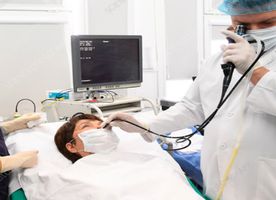Gastroenterology in Germany
Search and Compare the Best Clinics and Doctors at the Lowest Prices for Gastroenterology in Germany
D. Siegfried Block GmbH - Center For Living Cell Therapy





Gastroenterology at D. Siegfried Block GmbH - Center For Living Cell Therapy in Munich, Germany
HELIOS Hospital Hildesheim





Gastroenterology at HELIOS Hospital Hildesheim in Hildesheim, Germany
ISAR Klinikum Munich





Gastroenterology at ISAR Klinikum Munich in Munich, Germany
MEOCLINIC





Gastroenterology at MEOCLINIC in Berlin, Germany
HELIOS Hospital Berlin-Buch





Gastroenterology at HELIOS Hospital Berlin-Buch in Berlin, Germany
HELIOS Hospital Berlin-Zehlendorf





Gastroenterology at HELIOS Hospital Berlin-Zehlendorf in Berlin, Germany
Heidelberg University Hospital





Gastroenterology at Heidelberg University Hospital in Heidelberg, Germany
HELIOS Hospital Schwerin





Gastroenterology at HELIOS Hospital Schwerin in Schwerin, Germany
HELIOS Hospital Munich-West





Gastroenterology at HELIOS Hospital Munich-West in Munich, Germany
St. Lukas Group





Gastroenterology at St. Lukas Group in Dortmund, Germany
University Hospital of Munich (LMU)





Gastroenterology at University Hospital of Munich (LMU) in Munich, Germany
HELIOS Dr. Horst Schmidt Hospital Wiesbaden





Gastroenterology at HELIOS Dr. Horst Schmidt Hospital Wiesbaden in Wiesbaden, Germany
Capital Health - CityPraxen Berlin





Gastroenterology at Capital Health - CityPraxen Berlin in Berlin, Germany
HELIOS DKD Hospital Wiesbaden





Gastroenterology at HELIOS DKD Hospital Wiesbaden in Wiesbaden, Germany
University Medical Center Hamburg-Eppendorf





Gastroenterology at University Medical Center Hamburg-Eppendorf in Hamburg, Germany
Our partner clinics in Germany are accredited by the following associations












































































































































No Time?
Tell us what you're looking for and we'll reach out to the top clinics all at once
WHY US?












































































































































No Time?
Tell us what you're looking for and we'll reach out to the top clinics all at once





Gastroenterology is the field of medicine focused on the normal function and diseases of the digestive system or the gastrointestinal (GI) tract, including the esophagus, stomach, small intestine, pancreas, gallbladder, bile ducts, liver, as well as colon and rectum. Doctors who specialize in gastroenterology are called gastroenterologists. They are trained to diagnose and treat conditions of the digestive system. Some of the conditions that these specialists can treat include:
- Ulcers
- Acid reflux
- Irritable Bowel Syndrome (IBS)
- Polyps or growth that can occur in the large intestine (colon)
- Hepatitis C
- Jaundice (yellowing of the skin)
- Bloody stool
- Hemorrhoids
- Colon and bowel cancer
- Pancreatic cancer
- Esophageal cancer
- Gastric cancer
- Colitis
- Pancreatitis
While gastroenterologists can treat diseases of the digestive system, they do not perform surgery. If surgery is required they will work with or refer patients to a gastrointestinal surgeon. The following are a range of nonsurgical procedures that gastroenterologists perform:
- Colonoscopy to detect colon polyps and colon cancer
- Endoscopic ultrasound to examine the upper and lower GI tract
- Sigmoidoscopy to assess blood loss or pain in the bowel
- Endoscopic retrograde cholangiopancreatography to identify tumors, gallstones, or scar tissue in the bile duct
- Capsule endoscopy to examine the small intestine
- Liver biopsy to examine fibrosis and inflammation
- Polypectomy to remove a polyp.
How Long Should I Stay in Germany?
The type of procedure that you undergo determines your length of stay in Germany. Most procedures are performed on an outpatient basis, meaning you can leave the hospital or clinic on the same day. However, you generally need to stay in Germany for around a week for follow up appointments and to let your body recover before you can travel. If you undergo a diagnostic procedure, your doctor will discuss the results and create a treatment plan during the follow-up appointment.
What's the Expected Recovery Time?
Recovery time for gastroenterology procedures range from a day to 2 weeks, or sometimes longer, depending on the type of procedure. During the recovery period, it is important to avoid any strenuous activities. Your gastroenterologist will let you know the specific time you can resume your normal activities, go back to work, and perform vigorous exercises.
What Aftercare is Required?
It is crucial that you follow all of the instructions closely, to prevent the problem from getting worse or from reoccurring, you may need to make some dietary and lifestyle changes. You may also need to attend follow-up checkups to monitor your condition. You can have the checkups at home with your local doctor, or with your gastroenterologist in Germany.
What's the Success Rate?
Advances in gastroenterology have increased the safety and success rate of treatments. The diagnostic procedures offer high accuracy in finding problems within the gastrointestinal tract, and the treatments are found to be highly successful to treat conditions in the digestive system. For example, a colonoscopy now has a 94% success rate in capturing all colorectal cancer. Still, there are some risks to the procedures that you will need to be aware of, such as a tear in the intestine’s lining, excessive bleeding, adverse reaction to the equipment or medication used during the procedure, organ perforation, infection, and incomplete removal (for removal of polyps).
Are there Alternatives?
In most cases, there is no alternative to seeing a gastroenterologist if you experience problems in your digestive system and it is found to be caused by something else that is outside the gastroenterologists’ scope of practice, they will refer you to the relevant specialist.
This information has been accurately sourced and verified by a medical professional for its accuracy, however, we strongly recommend you to consult with your doctor before pursuing medical procedures overseas.



















